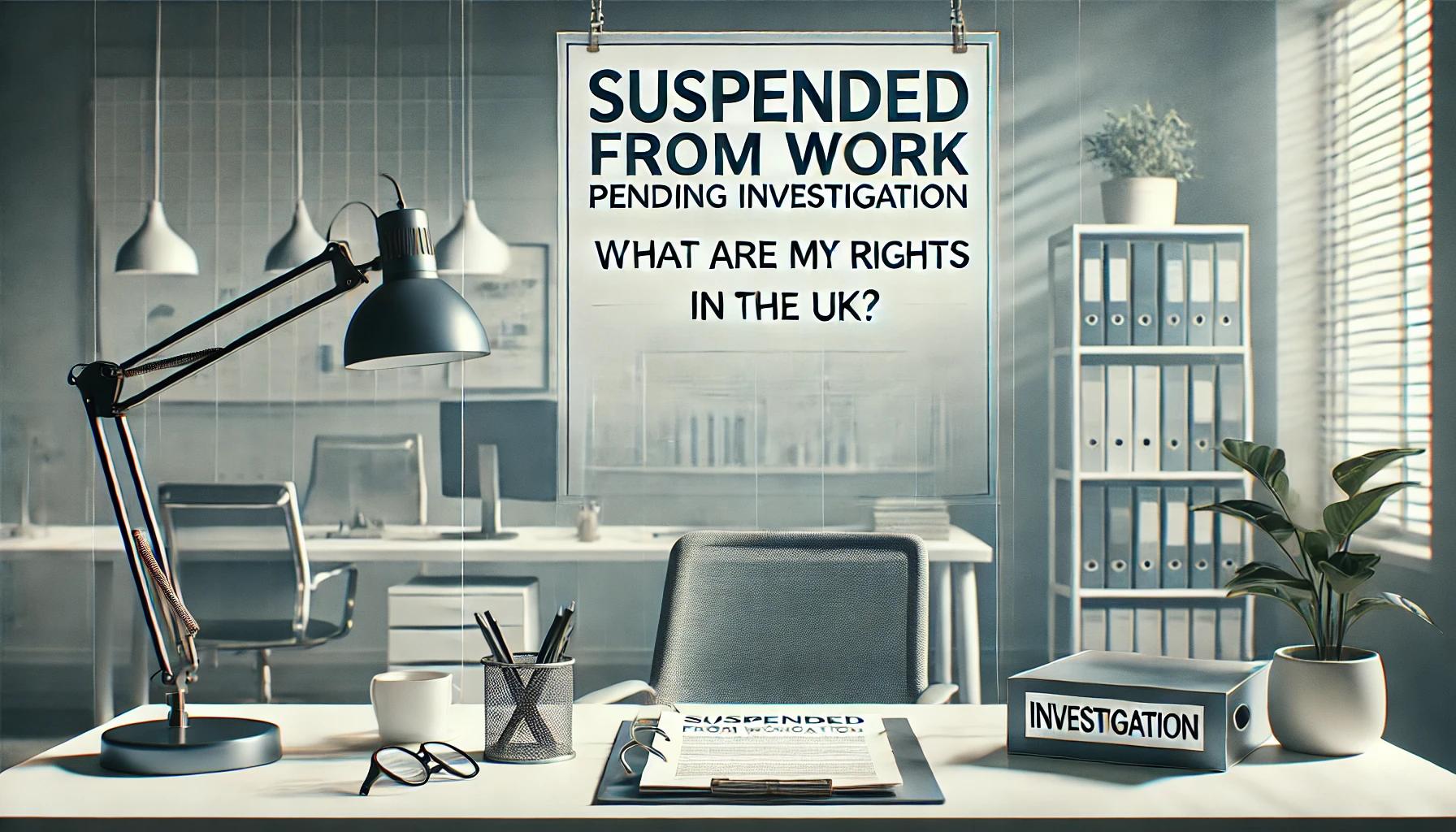Table of Contents
ToggleBeing suspended from work pending an investigation is an unsettling experience that can lead to uncertainty and stress.
It raises questions about your employment rights, financial stability, and the implications for your professional reputation. Suspension, often misunderstood as a punitive measure, is generally a precautionary action taken by employers during workplace investigations.
In the UK, employment law provides employees with protections to ensure fair treatment during such situations. This article offers an in-depth look at your rights, employer responsibilities, and the steps to take if you feel your suspension is unjustified.
What Does It Mean to Be Suspended from Work Pending Investigation?

Suspension is a temporary step that employers may take during workplace investigations into alleged misconduct or other issues.
It allows the employer to carry out a fair and unbiased investigation without the risk of interference, such as influencing witnesses or tampering with evidence.
Types of Suspension
- Suspension with Pay: Common in the UK, this ensures the employee receives their regular salary and benefits during the suspension period.
- Suspension without Pay: Less common, usually applied under specific contractual terms or in cases involving criminal charges or gross misconduct.
Key Characteristics of Suspension
- Temporary Nature: Suspension is not a final decision regarding employment status.
- Non-Punitive: It is meant to facilitate the investigation and is not considered disciplinary action.
- Presumption of Innocence: Being suspended does not imply guilt or wrongdoing.
Understanding these characteristics is essential for employees to protect their rights and address any misunderstandings about the process.
Your Rights When Suspended from Work Pending Investigation
In the UK, employment law protects employees during a suspension. Here’s what you’re entitled to:
1. Right to Pay
In most cases, employees are entitled to full pay during the suspension period. Employers cannot withhold pay unless there are explicit terms in the employment contract or specific legal grounds.
2. Right to Information
Employers must inform the employee of the reasons for suspension in a written notice. The notice should include:
- The nature of the allegations or concerns.
- The expected duration of the suspension.
- A point of contact for further inquiries.
3. Right to Fair Treatment
- Employers must ensure that the suspension is necessary and justified.
- They should explore alternatives, such as transferring the employee to another role or department, instead of opting for suspension.
4. Right to Confidentiality
The suspension and its underlying reasons should remain confidential to protect the employee’s reputation. Breaching confidentiality could result in claims for defamation or unfair treatment.
Common Reasons for Being Suspended from Work Pending Investigation

Suspensions are typically associated with serious workplace concerns. Below are the most common scenarios:
1. Allegations of Misconduct
These may include:
- Breach of company policies.
- Harassment or bullying complaints.
- Theft or fraud allegations.
2. Workplace Safety Concerns
An employer may suspend an employee if their presence poses a risk to others’ safety or the business environment. For example:
- Handling hazardous equipment while under investigation for negligence.
- Conflicts that could escalate if unresolved.
3. Risk to the Investigation
Suspension is often necessary to:
- Prevent interference with witnesses.
- Avoid tampering with evidence.
- Ensure impartiality during the investigation process.
Understanding why suspension occurs can help employees respond appropriately and prepare their case if they believe it to be unfair.
Employer Obligations When You Are Suspended from Work Pending Investigation

Employers have specific responsibilities to ensure that suspensions are carried out lawfully and fairly:
1. Clear Communication
The employer must provide written documentation that clearly explains:
- The reasons for the suspension.
- The process of the investigation.
- The employee’s rights during the suspension.
2. Reasonable Duration
Suspensions should last only as long as necessary. Employers are encouraged to regularly review the suspension and its necessity. Prolonged suspensions without justification may be deemed unfair.
3. Confidentiality
Employers must ensure that details of the suspension and allegations remain private to protect the employee’s dignity and prevent reputational harm.
4. Support During Suspension
Employers are encouraged to maintain regular communication with the employee, providing updates on the investigation’s progress. Lack of communication can lead to claims of neglect or unfair treatment.
Can You Challenge Being Suspended from Work Pending Investigation?
Employees have the right to challenge a suspension if they believe it is unwarranted or improperly handled.
Steps to Challenge a Suspension
- Request Clarification: Ask for a detailed explanation and supporting evidence for the suspension.
- File a Grievance: Use the company’s grievance procedure to formally raise concerns.
- Seek Legal Advice: Consult an employment lawyer or trade union representative for guidance on your case.
- Raise a Claim: If the suspension breaches your employment rights, you may file a claim for unfair treatment or constructive dismissal.
Grounds for Challenging a Suspension
- Lack of evidence to justify the suspension.
- Breach of contractual terms.
- Excessive or unreasonable duration of the suspension.
ACAS Guidelines for Suspension from Work Pending Investigation

The Advisory, Conciliation and Arbitration Service (ACAS) offers comprehensive guidelines to ensure fair treatment of employees during suspension:
Key Recommendations
- Suspension as a Last Resort: Employers should consider alternatives before suspending an employee.
- Maintain Communication: Regularly update the employee about the investigation’s progress.
- Review Suspension Necessity: Continuously evaluate whether the suspension remains justified.
Employers who fail to follow these guidelines may face legal challenges from employees claiming unfair treatment.
Paid vs Unpaid Suspension When Suspended from Work Pending Investigation
Paid Suspension
Paid suspension is the most common type of suspension in the UK and is generally preferred by employers to avoid claims of prejudgment or unfair treatment.
1. Ensures Financial Stability During the Investigation
Paid suspension provides employees with their regular salary and benefits, allowing them to meet personal financial obligations while the investigation is ongoing. This measure prevents undue hardship on the employee, especially in cases where the investigation is prolonged.
2. Maintains a Neutral Stance
By paying the employee, the employer signals that the suspension is not a punishment or a judgment of guilt. This approach aligns with the principle of “innocent until proven guilty,” reducing the risk of legal disputes.
3. Preserves the Employment Relationship
A paid suspension helps maintain the professional relationship between the employee and employer. By keeping the employee’s financial well-being intact, the employer demonstrates a commitment to fairness, which is essential if the employee is ultimately exonerated and returns to work.
4. Practical Considerations for Employers
While paid suspension may incur costs for the employer, it is often a less risky and more ethical approach. Unpaid suspension, on the other hand, can lead to disgruntled employees and potential claims for breach of contract or unfair treatment.
Unpaid Suspension
Unpaid suspension is less common and generally reserved for severe cases. It is only permissible under specific circumstances, as outlined in the employment contract or agreed policies.
When Is Unpaid Suspension Allowed?
- Explicit Terms in the Employment Contract: Employers must clearly state the conditions under which unpaid suspension can occur in the employee’s contract or company policies.
- Cases of Gross Misconduct: In situations involving serious breaches, such as theft, violence, or fraud, employers may opt for unpaid suspension while investigations proceed.
- Criminal Charges: If an employee is facing legal charges outside of work, employers may implement unpaid suspension until the matter is resolved.
Impact on Employees
Unpaid suspension can have severe consequences for employees, including:
- Financial hardship, as they lose their income during the suspension period.
- Emotional stress and uncertainty about the future of their employment.
- Damage to professional reputation if the suspension is mishandled or made public.
Employer Considerations
Employers must tread carefully when imposing unpaid suspension. Without clear contractual backing or justified reasoning, such actions could expose them to legal claims for unfair treatment, constructive dismissal, or breach of contract.
What to Do If You Feel Your Suspension from Work Pending Investigation Is Unfair?

Feeling unjustly suspended can be stressful, but there are steps you can take to address the situation:
1. Document Everything
Keep detailed records of:
- Communications with your employer.
- The suspension notice and its reasons.
- Any events leading up to the suspension.
2. Seek Representation
Contact a trade union representative, solicitor, or ACAS for professional advice.
3. File a Grievance
Follow the company’s grievance procedures to formally raise your concerns.
4. Remain Professional
Cooperate with the investigation while advocating for your rights. Emotional outbursts or unprofessional behaviour could undermine your position.
Suspension Policies in Employment Contracts and Your Rights
Your employment contract and company policies often outline the terms surrounding suspension:
- Suspension procedures and criteria.
- Pay entitlements during suspension.
- Timelines and review processes.
Reviewing these documents helps employees understand their rights and prepare for any disputes arising from a suspension.
Conclusion
Being suspended from work pending investigation can be a daunting experience, but understanding your rights ensures you remain protected. In the UK, employees are entitled to fair treatment, confidentiality, and in most cases, full pay during suspension. Employers have a duty to act responsibly and transparently, avoiding any actions that could unfairly harm the employee.
If you believe your suspension is unjustified, take action by seeking legal advice, documenting events, and challenging the decision through appropriate channels. Staying informed and proactive can make all the difference in navigating this challenging situation.
FAQ
How long can an employer legally suspend you in the UK?
There is no fixed duration, but suspensions must be reasonable and reviewed regularly.
Are you entitled to pay during suspension?
Yes, most suspensions in the UK are paid unless stated otherwise in your contract.
Can suspension affect your career or reputation?
It can, particularly if confidentiality is breached. Seek legal advice if this occurs.
What should you do if your employer doesn’t provide reasons for suspension?
Request written clarification and consult a solicitor if necessary.
Is suspension always a precursor to termination?
No, suspension is a precautionary measure, not an indication of guilt.
How can ACAS help in resolving suspension disputes?
ACAS provides guidance and mediation services to address disputes fairly.
Are there any risks of resigning during a suspension?
Yes, resigning may affect your ability to challenge unfair treatment or seek compensation.




